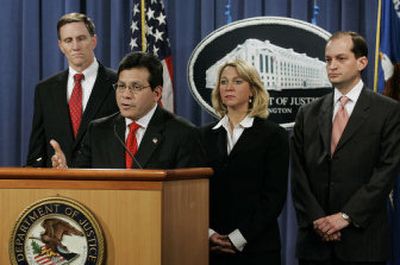‘Dirty bomber’ indicted on conspiracy charges

WASHINGTON – Jose Padilla has become known as the “dirty bomber” who was stopped and imprisoned before he could launch a deadly attack on U.S. soil.
But after spending more than three years in a military brig without being charged with a crime, Padilla is now accused of being part of a terrorist conspiracy to murder people overseas.
Padilla was one of only two U.S. citizens who’ve been held as enemy combatants, a controversial tool in the Bush administration’s post-Sept. 11 war against terrorism, which essentially puts suspects in a legal no-man’s land behind bars.
The criminal charges against Padilla, announced on Tuesday, are likely to help the government avoid a showdown over the issue before the Supreme Court. Padilla’s lawyers have been demanding that the government either charge their client or release him.
Conspicuously absent from the indictment were the government’s most dramatic allegations against Padilla. Over the three years, the government has said that the 35-year-old, while in military custody, confessed to wanting to detonate a radioactive “dirty bomb” and to planning to blow up apartment buildings.
Attorney General Alberto Gonzales wouldn’t comment on why those charges weren’t included. But he said that the government’s case against the former Chicago gang member was strong and could bring a sentence of life in prison.
“The indictment alleges that Padilla traveled overseas to train as a terrorist with the intention of fighting a violent jihad,” Gonzales said at a news conference. “In a nutshell, a conspiracy to murder, to maim, to kidnap; a conspiracy to provide material support to terrorists.”
Padilla’s lawyer, Donna Newman, said she was pleased that her client would finally have the opportunity to fight criminal charges in court.
Legal experts said prosecutors were hamstrung on several fronts from bringing a case against Padilla for allegedly plotting an attack on U.S. soil.
Padilla’s statements to his interrogators while in military custody would likely be inadmissible in court because they were made without a defense lawyer present. Then-Deputy Attorney General James Comey acknowledged as much in a June news conference with reporters.
The government also could be forced to disclose sensitive intelligence, and any such case would bring unwanted attention on U.S. detention and interrogation techniques, which already are under fire.
Senior Justice Department officials, who spoke on condition of anonymity, acknowledged that cases such as Padilla’s are difficult to bring in open court. The government’s terrorism case against Zacarias Moussaoui, the only person charged in the United States in connection with the Sept. 11 attacks, has been mired in appeals over the defense’s demand for access to Khalid Shaikh Mohammed, the alleged mastermind of the Sept. 11 attacks who is being held at a secret location outside the United States, and other al-Qaida operatives.
Padilla was one of four people charged in an 11-count indictment handed up by a federal grand jury in Miami on Nov. 17. The others charged are Adham Hassoun, Mohammed Youssef and Kifah Jayyousi. All three had been charged previously with terrorism-related crimes.